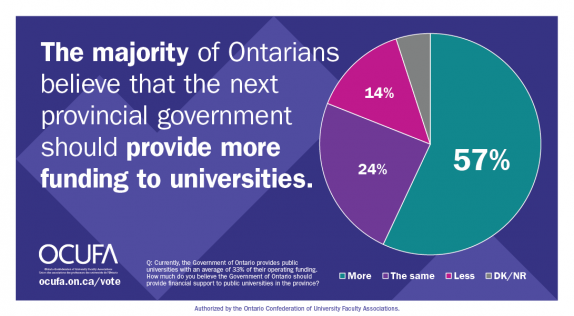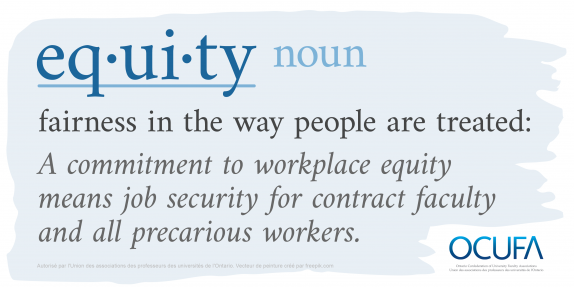TORONTO, April 25, 2022 – The Ontario Confederation of University Faculty Associations (OCUFA) is calling on university administrators across the province to maintain campus masking mandates until at least the end of August. With new COVID-19 cases reaching peaks surpassing previous waves of the pandemic and other health and safety measures having been lifted, masking mandates on Ontario’s bustling university campuses are a vital and simple way to slow the spread of the virus.
“Throughout this pandemic, OCUFA has consistently urged university administrations to engage with faculty and campus health and safety committees and take a cautious, measured approach,” said Sue Wurtele, OCUFA President. “Throughout this pandemic, university administrations have excluded faculty from these decision-making processes and created serious disruption by frequently changing course. This has led to unnecessary stress and anxiety amongst faculty, staff, and students.”
Following the Ford government’s ill-advised decision to drop provincial masking mandates on March 21, Ontario universities announced they would be pausing their mandates on May 1. However, as case counts remain troublingly high, several universities have decided to extend masking and vaccination mandates for at least another month. These extensions have come as university faculty and academic librarians point to the increased threat of COVID-19 transmission without proper health and safety protections, as well as the disruptive effects of repeated pivoting.
At the beginning of April, Brock University extended their vaccine and mask mandates after reaching a mediated agreement with the Brock University Faculty Association (BUFA) prompted by a grievance filed by the faculty association. In addition to extending the vaccine and mask mandates at Brock, any future changes to these policies must now be negotiated with BUFA. More recently, Carleton University, the University of Guelph, McMaster University, the University of Ottawa, Queen’s University, Trent University, the University of Waterloo, Wilfrid Laurier University, and York University have also decided to extend their masking mandates following pressure from faculty, though some for only an additional month.
“The health and safety of all members of the campus community remains the top priority of Ontario’s university faculty and academic librarians,” said Wurtele. “We know cases are sky-high. We know COVID-19 is more contagious than ever. We know the science and we listen to regional medical officers of health when they recommend masking policies stay in place. With tens of thousands of daily interactions on our campuses, we must be cautious as we move forward and minimize uncertainty and disruption. University administrations across Ontario should do the right thing and extend masking mandates until the end of the summer.”
As COVID-19 continues to rage across Ontario, university administrators must work through existing shared governance structures to determine appropriate health and safety measures on campus. Cases are at record highs and, although the summer might bring some reprieve, we must not repeat the mistakes of previous years. We must proceed cautiously and minimize the potential for on-campus transmission as well as the disruption caused by constant changes in policy.
Founded in 1964, OCUFA represents 17,000 faculty, academic librarians, and other academic professionals in 31 member associations across Ontario. It is committed to enhancing the quality of higher education in Ontario and recognizing the outstanding contributions of its members towards creating a world-class university system. For more information, please visit the OCUFA website at www.ocufa.on.ca.
-30-
For more information, contact:
Ben Lewis, Communications Lead at 416-306-6033 or communications@ocufa.on.ca







